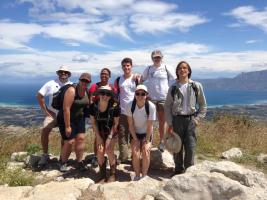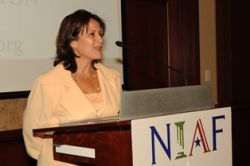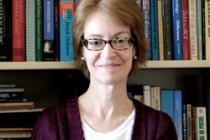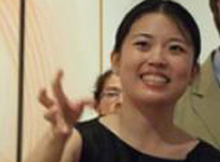The University of Maryland’s College of Arts and Humanities is pleased to announce the second round of Foxworth Creative Enterprise Initiative recipients. This latest round includes Leslie Felbain, associate professor in the School of Theatre, Dance, and Performance Studies; Merle Collins professor in the Department of English and Scott Wible, associate professor in the Department of English along with Ph.D. candidates Heather Lindenman and Justin Lohr.
The 2015 recipients will lead several arts and humanities courses in the spring semester whose themes support community needs and whose products enhance student learning and engagement. The development of those courses is sponsored by the Foxworth Initiative.
One course will use interactive theater to explore self-esteem and personal boundaries with at-risk high school students. Another course will work with a local non-profit to introduce Caribbean literature and culture to traditionally underrepresented youth. A final course teams ninth graders at a local high school with “college buddies” to encourage social activism and effective change by exploring a social issue through use of rhetoric, theatre, dance or poetry.
“Funding from the Foxworths provides students an opportunity to become deeply engaged in the experiences of people of diverse heritages and economic backgrounds,” Bonnie Thornton Dill, dean for the College of Arts and Humanities, said. “They participate in meaningful cultural and civic exchanges that promote greater awareness of the value and importance of the arts and humanities.”
This initiative is made possible by the generosity of two college alumni, Domonique and Ashley Foxworth. Domonique, Class of 2004, is a graduate of American Studies and Ashley, ’06, is an English alumna. The Foxworth Initiative is intended to support learning that brings students in contact with their surrounding communities as partners and allies in practices that help transform and bring about social justice. Courses supported by the initiative provide students with skills and critical thinking that support continued community engagement beyond their college career. For more information, visit www.arhu.umd.edu/foxworth.
2015 FACULTY COHORT
Faculty Lead: Leslie Felbain, associate professor, School of Theatre, Dance, and Performance Studies
Course: Theatre of the Oppressed, TDPS458T
Social Issues: Violence, abuse, addiction, crime, bullying and inequity.
Approach: Students will learn about “Theatre of the Oppressed,” a form of community-based education that uses theater as a tool for social and political activism and transformation. In this case, the course will address self-esteem and boundaries as they relate to a wide range of violations that result in trauma and violence and how those experiences become normalized because of social and institutional values.
Weekly to bi-weekly workshops will be scheduled and personal exchanges between the student groups will help build trust as well as inform the scenarios and situations to be explored by both groups of students. The course will be documented through journaling, visual arts, video and audio recordings. UMD students will also be required to write a paper documenting their research in applied theatre.
This course will address at-risk high school students. Among the specific communities is the Maya Angelou Academy, an in-house school for incarcerated juveniles in Laurel, Md.
Community benefit: By interacting in a safe environment a new, expanded community will develop, one in which all participants will be valued equally and learn from each other. The participants will brainstorm working solutions and strategies for topics explored. An important goal of the project is to inspire all of the participating students to expand their horizons, learn the techniques presented and share these techniques with other communities. Students will be encouraged to continue their education and become spokespeople for causes that are important to them and impact their communities.
Faculty Lead: Merle Collins, professor of comparative literature and English
Course: “Caribbean Stop: Poetry and Short Stories from the Region," ENGL368C
Social Issue: Access to education
Approach: This project-based course is designed to provide UMD students the chance to work with the non-profit Cultural Academy for Excellence (CAFÉ), which serves elementary school children in Prince George’s County, Md. The course will introduce UMD students to selected works of Caribbean literature. Subsequently, the students will introduce these works to students at CAFÉ. UMD students will work with young people, helping with basic homework and contributing to the development of the confidence needed to accomplish academic goals. They will also be required to submit weekly reports and keep a journal throughout the semester that outlines their activities and methodologies.
The course will also produce a musical production on the steelpan of a short story entitled “Pan,” written by a celebrated Caribbean writer. The steelpan production will be directed by a musician who works with CAFE students. It will give UMD students a deeper understanding of oral traditions in Caribbean literature and will benefit the CAFÉ children, who will experience working collectively on a cultural and literary production with university students.
Community benefit: In additional to improving academic performance, UMD students will help expand CAFÉ participants’ cultural and literary abilities by teaching them about Caribbean literature. By acting as teachers and role models, UMD students—already an example of success among young adults—will show elementary students that university education is an attainable goal.
Faculty Lead: Scott Wible, associate professor, Department of English.
Student Lead: Heather Lindenman, Ph.D. candidate and Justin Lohr, professional track faculty member, Department of English
Course Title: Writing for Change ENGL292 and ENGL388C
Social Issues: Educational inequity, literacy, civic education, intercultural communication
Approach: “Writing for Change” connects ninth grade students from Northwestern High School in Hyattsville, Md. with UMD “college buddies.” Over the course of the semester, the students and their college buddies will be co-tasked with improving their community by raising awareness of and proposing solutions to a pressing issue. Students might choose to tackle their issue through any number of genres including dance, dramatic monologues or spoken word poems. The college students will teach their buddies about writing concepts, such as audience awareness and literary strategies, while also mentoring them on time management and empathetic reasoning. The course will be documented through letters between the high schoolers and their buddies, essays and websites created and curated by both parties but maintained by the college students.
Community benefit: In the process of composing, revising and performing their projects, the teams of students learn how to exercise their rhetorical savvy to affect their communities. For example, the issue students and their buddies choose might relate to intercultural conflicts, drug use in their community or discrimination by the police—anything that the high school students collectively decide needs to be addressed. At the heart of the course is the notion that the arts and writing can be used to bring about demonstrable change in two ways: by bringing together community members in a performance event and public forum and by compelling each individual composer to reconsider his or her subject position, creative capacity and civic responsibility. The high school students will not only give the UMD students an opportunity to transform words into action, but they will introduce the college students to their local communities.











